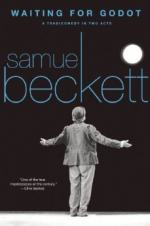
|
| Name: _________________________ | Period: ___________________ |
This test consists of 5 short answer questions, 10 short essay questions, and 1 (of 3) essay topics.
Short Answer Questions
1. Estragon is interested in understanding Lucky and wants to find out why he
2. A piece of costuming that Estragon, Vladimir, Pozzo, and Lucky wear throughout the play is a
3. After Estragon repeatedly asks Pozzo to sit down, Pozzo finally does and then tells Estragon and Vladimir that he must
4. Vladimir and Estragon talk about the crucifixion of Jesus and the different views of the four Evangelists who record that event. What is the topic that is described differently between the four Evangelists?
5. When Estragon pushes Vladimir to tell him the story about the Englishman in the brothel, Vladimir
Short Essay Questions
1. What happens to the bones after Pozzo has finished eating?
2. What is the subject of Vladimir's song, and why do you think Beckett used this particular song?
3. What does Estragon decide to do with his boots and why does Vladimir tell him he can't do that?
4. What happens when Estragon tries to help Lucky when is is crying?
5. In the first act, what does the boy tell Estragon and Vladimir about Mr. Godot?
6. What does Pozzo tell Estragon and Vladimir about tears and laughter?
7. Estragon is closely associated with a particular prop. What is that prop? Why do you think Beckett chose that prop and what does it contribute to the play?
8. Estragon and Vladimir talk about the crucifixion of Christ and, later, about offering a prayer or supplication to Godot. Why might Beckett reveal this vague connection between God and Godot?
9. Just before he finally leaves in Act I, what does Pozzo observe about leaving? What does he feel he needs to do to be able to leave?
10. In Act 1, when Vladimir leaves the stage to go to the bathroom, what do Pozzo and Estragon stare at off stage? What does Estragon tell Vladimir about it when he returns?
Essay Topics
Write an essay for ONE of the following topics:
Essay Topic 1
There are times that all of us feel as if life is pointless. How did "Waiting for Godot" help you understand that feeling? Did it encourage you because you can see that you are going somewhere in your life, after all, considering what your are doing with your life like going to school and reading plays. Or did it show you that like the characters in the play, you are not doing anything to move your life ahead?
Essay Topic 2
Estragon is beaten during the two nights the play covers. He seems to accept the beatings as a part of life. What do you think Beckett was trying to say? Keep in mind that when Vladimir tells Estragon he would have stopped the beating, he doesn't mean that he would have stopped the people who beat Estragon, but that he would stop Estragon from doing whatever he had done to antagonize those who beat him.
Essay Topic 3
Twice, Estragon awakes from a dream. Both times, he tries to tell Vladimir about the dream, but Vladimir refuses to listen. Why do you feel that Vladimir doesn't want to hear Estragon's dreams? What do you think Beckett was trying to say about dreams, and how do you think this contributes to Beckett's story?
|
This section contains 1,043 words (approx. 4 pages at 300 words per page) |

|




